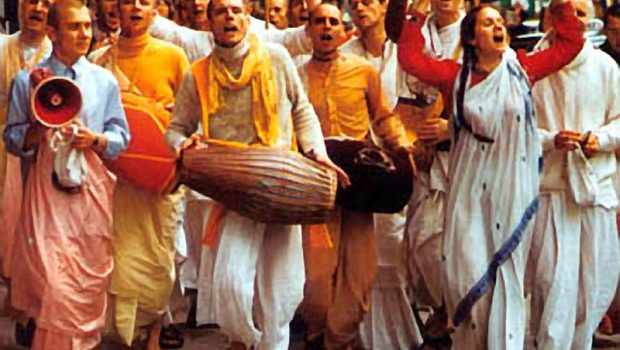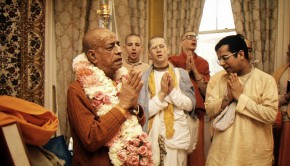Kirtan: Ancient Medicine for Modern Man
What do football games, rock concerts, political rallies, boxing matches and revival meetings all have in common? The mass glorification of a person or persons engaged in extraordinary feats — a very exciting, even electrifying experience which can give incredible pleasure to large groups of people. This phenomenon is known as kirtana.
To glorify, reciprocate, and communicate with a “super person” is very natural and pleasurable for everyone. But when the politician is scandalized, the football player is injured or the rock star overdoses, the pleasure-giving relationship is broken. Immediately, the search for a new, higher relationship begins. This search is the purpose of human life.
This search for unending pleasure in a permanent relationship is going on throughout the creation, manifesting in endless varieties of would-be heroes and their would-be followers. This fundamental desire of the human being can never be satisfied on the material plane where old age, disease, death and dishonor destroy all such temporary relationships.
Glorification of God alone can bring the highest happiness in an unending relationship. Throughout history, singers, dancers, artists, monks, priests and yogis have glorified God with enthusiasm and great satisfaction by chanting His holy name.
Kirtana, glorification of God through His names, is not a sectarian religious practice. It is the natural fulfillment of every person’s desire to sing, praise, cheer and chant the glories of a superior person’s extraordinary activities. It brings happiness, peace and harmony to all persons who thus find their common object of adoration — God.
Hansadutta Prabhu, one of the first Western disciples of Srila Prabhupada explains, “Presently we’re travelling world-wide and introducing world-wide Krishna-kirtana. Now, people experience the kritana of a football game, a baseball game, or a concert — the congregation of many people shouting cheering and singing. These mundane kirtanas are only for the body or mind. Because they are temporary, their pleasure is only temporary. The same principle of these materialistic kirtanas exists in Krishna-kirtana, only it’s effect is spiritual and everlasting. When the devotees are performing Krishna-kirtana and everyone is enthusiastically chanting Hare Krishna, it has great potency for invoking the Lord. This is the sankirtana movement of Lord Caitanya.”
Lord Sri Caitanya, founder of the sankirtana movement for spreading the chanting of the holy names of God, instructed His disciples to write books on the science of Krishna consciousness, a task which His followers have continued to carry down to the present day. Although Lord Caitanya was widely renowned as a scholar in his youth, He left only eight written verses which are given below. These eight verses clearly reveal His mission and precepts.
This book — “Kirtana: Ancient Medicine for Modern Man” — presents a clear understanding of the transcendental nature and effects of chanting Hare Krishna. This simple book, following in the spirit of these eight powerful verses, makes the ancient practice of chanting Hare Krishna understandable to the Modern Man. These prayers are translated as follows:
1
Glory to the Sri Krishna sankirtana, which cleanses the heart of all the dust accumulated for years and extinguishes the fire of conditional life, of repeated birth and death. This sankirtana movement is the prime benediction for humanity at large because it spreads the rays of the benediction moon.
It is the life of all transcendental knowledge. It increases the ocean of transcendental bliss, and it enables us to fully taste the nectar for which we are always anxious.
2
O my Lord, Your holy name alone can render all benediction to living beings, and thus You have hundreds and millions of names like Krishna and Govinda. In these transcendental names You have invested all Your transcendental energies. There are not even hard and fast rules for chanting these names. O my Lord, out of kindness You enable us to easily approach You by chanting Your holy names, but I am so unfortunate that I have no attraction for them.
3
One should chant the holy name of the Lord in a humble state of mind, thinking oneself lower than the straw in the street; one should be more tolerant than a tree, devoid of all sense of false prestige, and ready to offer all respect to others. In such a state of mind one can chant the holy name of the Lord constantly.
4
O almighty Lord, I have no desire to accumulate wealth, nor do I desire beautiful women, nor do I want any number of followers. I only want Your causeless devotional service birth after birth.
5
O son of Maharaja Nanda [Krishna], I am Your eternal servitor, yet somehow or other I have fallen into the ocean of birth and death. please pick me up from this ocean of death and place me as one of the atoms of Your lotus feet.
6
O my Lord, when will my eyes be decorated with tears of love flowing constantly when I chant Your holy name? When will my voice choke up, and when will the hairs of my body stand on end at the recitation of Your name?
7
O Govinda! Feeling Your separation, I am considering a moment to be like twelve years or more. Tears are flowing from my eyes like torrents of rain, and I am feeling all vacant in the world in Your absence.
8
I know no one but Krishna as my Lord, and He shall remain so even if He handles me roughly in His embrace or makes me brokenhearted by not being present before me. He is completely free to do anything and everything, for He is always my worshipful Lord unconditionally.
[From the book Kirtana: Ancient Medicine for Modern Man by Hansadutta dasa]














